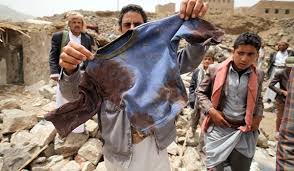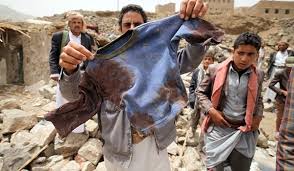Just a few short years ago, Yemen was judged to be among the poorest countries in the world, ranking 154th out of the 187 nations on the U.N.’s Human Development Index. One in every five Yemenis went hungry. Almost one in three was unemployed. Every year, 40,000 children died before their fifth birthday, and experts predicted the country would soon run out of water.
Such was the dire condition of the country before Saudi Arabia unleashed a bombing campaign in March 2015, which has destroyed warehouses, factories, power plants, ports, hospitals, water tanks, gas stations, and bridges, along with miscellaneous targets ranging from donkey carts to wedding parties to archaeological monuments. Thousands of civilians — no one knows how many — have been killed or wounded. Along with the bombing, the Saudis have enforced a blockade, cutting off supplies of food, fuel, and medicine. A year and a half into the war, the health system has largely broken down, and much of the country is on the brink of starvation.
This rain of destruction was made possible by the material and moral support of the United States, which supplied most of the bombers, bombs, and missiles required for the aerial onslaught. (Admittedly, the United Kingdom, France, and other NATO arms exporters eagerly did their bit.) US Navy ships aided the blockade. But no one that I talked to in Washington suggested that the war was in any way necessary to our national security. The best answer I got came from Ted Lieu, a Democratic congressman from California who has been one of the few public officials to speak out about the devastation we were enabling far away. “Honestly,” he told me, “I think it’s because Saudi Arabia asked.”
The principal targets of the Saudi bombers (augmented by a coalition of Arab allies) have been a tribal group from the north of Yemen, adjacent to the Saudi border, who follow Zaidism, an offshoot of Shia Islam. Though it is distinct from the variant of Shiism practiced in Iran, the connection was destined to excite the suspicions of the fervently anti-Iranian Saudi regime.
So, almost forty years ago, the Saudis planted an outpost of their own extreme Wahhabi sect in the heart of Zaidi territory. The emissary sent to found the madrassa was Muqbil al-Wadie, a leader of the 1979 assault on Mecca’s Grand Mosque, who had until that moment been rotting in a Saudi prison. As has been their habit, the Saudis solved their own terrorism problem by exporting it.
The intrusive enterprise, which attracted a growing stream of militant Sunnis, eventually provoked a reaction among the local Zaidis in favor of their Shia tendencies. Accordingly, under the leadership of Hussein al-Houthi, they sought religious instruction from Iran in the form of teachers and literature, which were duly supplied, much to Riyadh’s irritation.
For many years, this Iranian connection was treated with equanimity by Yemen’s president, Ali Abdullah Saleh. Following 9/11, however, he came under pressure from Washington to play his part in the war against Al Qaeda, which had been active in Yemen since the late 1990s. Saleh found this mission unappealing, given the terrorist group’s connections with some of the country’s most powerful political forces. According to Abdul-Ghani al-Iryani, an activist whose family has long played a leading role in the nation’s politics, Saleh suggested to the Americans that he first deal with the Shiite troublemakers in the north. “From day one,” Iryani told me, “the Houthis were presented as an Iranian client, a terrorist movement.” This policy, unsurprisingly, was greeted with favor in Riyadh, and reciprocated with commensurate financial largesse.
Privately, US officials were doubtful of the Iranian connection, even at the beginning of Saleh’s campaign against the group in 2004. “The fact that after five years of conflict there is still no compelling evidence of that link must force us to view this claim with some skepticism,” wrote the US ambassador to Yemen, Stephen Seche, in a classified 2009 cable later released by WikiLeaks. Nevertheless, the Americans were eager to secure Saleh’s cooperation against Al Qaeda. They did little to restrain him in his war with the Houthis, as they came to be called following the death of Hussein al-Houthi in 2004.
Fair Use excerpt. Read entire article at Harper’s.


